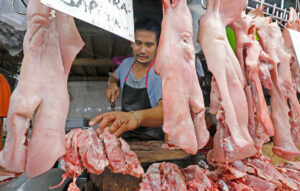THE GOVERNMENT announced plans to more actively intervene in the pork market to address high prices, saying it will expand a direct-sourcing program to reduce the number of layers in the value chain.
Food Terminal, Inc. (FTI) is stepping in to replace middlemen by buying more hogs from farms, delivering them to slaughterhouses, and supplying retailers in Metro Manila, Agriculture Secretary Francisco Tiu Laurel, Jr. told reporters.
He said retailers participating in the direct-sourcing scheme will be allowed to charge a margin of P30-P50 per kilo.
“We’re trying to cut the middlemen. But they will not totally disappear,” Mr. Laurel said.
In this manner, the FTI will seek to influence pork prices by forcing parts of the supply chain, including non-participating retailers, to match its pricing, according to Mr. Laurel.
“If we compete with other retailers, then prices should go down. We’re creating competition,” he said.
The FTI first tested the direct-sourcing scheme with Charoen Pokphand Foods PLC (CP Foods), from which the government bought 100 live hogs daily for slaughter in Metro Manila.
Mr. Laurel said the FTI has signed partnerships with three hog farms and plans to expand the program.
FTI, a government-owned corporation, is seeking a P500-million standby budget from Malacañang for the scheme as it seeks to procure 150,000 metric tons (MT) of live hogs by year’s end, he added.
Mr. Laurel said the discontinued Maximum Suggested Retail Price (MSRP) for pork will be brought back once meat regulators finalize the internal rules for the program.
The MSRP imposed in March at P350 per kilo for pork leg/ham and shoulder, P380 for pork belly, and P300 for fresh carcasses — will remain unchanged, after the industry pleaded that the price is difficult to comply with.
Hog producers had lobbied for the lifting of the price cap, citing the continuing impact of African Swine Fever (ASF) on production.
Compliance with the MSRP was below 5% as of May 2, the Department of Agriculture (DA) said.
The DA is still “fixing” internal rules, particularly on the side of the National Meat Inspection Service (NMIS), Mr. Laurel said.
Hog production in the first quarter of 2025 declined 3.7% year on year to 403.79 thousand MT on a liveweight basis.
Mr. Laurel said ASF vaccines being conducted by the Food and Drug Administration (FDA) are moving closer to a commercial rollout.
On Thursday, the Meat Importers and Traders Association (MITA) told BusinessWorld that the government has proposed an additional minimum access volume (MAV) or MAV Plus of 150,000 MT for imported pork.
MITA had earlier proposed a 500-MT MAV Plus allocation after pork production fell to 900,000 MT from the pre-ASF level of one million MT.
Citing a letter to the MAV Advisory Council dated May 27, MITA President Jesus C. Cham said via Viber that his group is proposing that the annual MAV Plus volume be at least 200,000 MT for the three remaining years of the Marcos administration.
Mr. Laurel said in mid-May that the DA had allocated this year’s 54,210-MT MAV minimum for pork.
The MITA said in its letter to the MAV Council that the 200,000-MAV Plus allocation it is requesting will be available to qualified importers on a first-come-first-served basis.
“Each importer shall be capped at a maximum of 1,000 tons in order to prevent any single importer from cornering the volume,” it said.
Pork imports under the MAV arrangement are charged a tariff of 15% for shipments within the quota. Outside the quota, shipments pay a 25% tariff. — Kyle Aristophere T. Atienza

